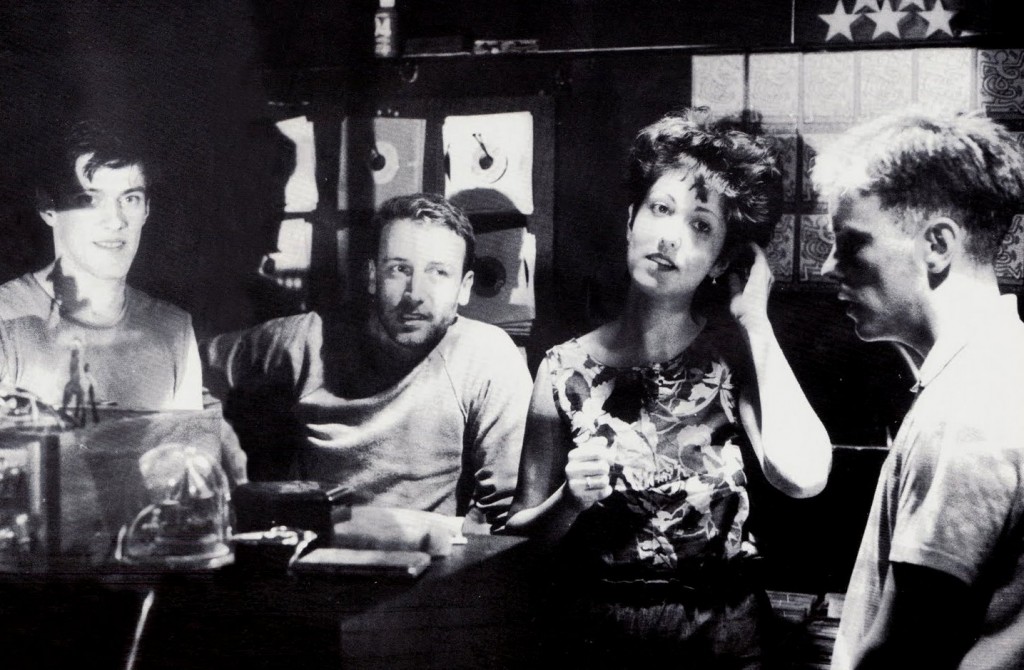When talking about the four decades of New Order‘s musical history (whether you’d like to include Joy Division in here or not) it appears that all music nerds got their own favourite record, song and memory connected to the influential wave pop outfit from Manchester. Of course, there’s the inevitable Blue Monday which still is the best selling 12-inch single of all time. But you also got those irresistible 80s pop gems like Bizarre Love Triangle, Temptation and True Faith. Or their only number one hit so far, England’s 1990 World Cup anthem World In Motion. Later generations might also enjoy 2001’s comeback single Crystal but only rarely do people acknowledge the band’s only official album release of the 1990s, Republic. In the long and complex discography the group’s sixth studio full-length often feels like a misfit within their own back catalogue. Wrongly, I must say.
Republic happened at a weird period of time. Following the unstoppable intoxication of the 1980s which saw New Order rise to fame as well as the entire Manchester music scene, this album arrived after a four year long break following the critically claimed LP Technique. Tony Wilson’s long lasting but highly uneconomic label Factory Records was sold to London Records, the band more or less broke with their former mentor following the issues around the infamous Hacienda nightclub (New Order bassist Peter Hook has written a nice book about this one) and tensions between the single members were already high before they entered the studio. In many ways, Republic was an economic necessity as the band lost a lot of money via the poor deal with Factory Records and their involvement with the Hacienda. While 1989’s Technique was also musically surfing high on the ‘Madchester’ rave wave, the sound and the music scene had changed in those four years. Grunge and alternative rock attracted the kids and the Britpop movement was already visible on the horizon. The rave and dance scene in Europe moved towards trashier territory and many pop bands of the 80s didn’t know where to go from here. Republic was released in that uncertainty.
Those special circumstances resulted in a record that doesn’t sound like any other New Order album before and after. Maybe that’s a reason why it became one of my favourites. Produced with the help of 80s pop producer heavyweight Stephan Hague (who already helped on various singles of the group before) the band created an atypical early 90s pop album, riding on break beats, big synth layers and a certain electronic playfulness with ‘over-the-top’ tendencies. To this day there’s this persistent rumour that Republic itself was nothing more than a Bernard Sumner solo album he crafted with Hague. The organic elements – Sumner’s guitar, Peter Hook’s distinctive bass and Stephen Morris’ drums – are way less present than on any other of their albums. Except for the rocking lead single Regret all of the tracks are based on a programmed and electronic foundation, making it not really feel like a band record. But on the other hand that’s somehow always been the case with New Order‘s sound anyway – the symbiosis of those multiple musical worlds.

NEW ORDER back in the days
The songs itself are some of their best ones, however. World (Price Of Love) rides on a delicate break beat while Chemical and Spooky breath the energy of early 90s rave enthusiasm. Young Offender delivers uplifting Ibiza house vibes (that piano) while songs like Ruined In A Day and the critically underrated Special lose themselves in layers of sounds and synthetic pads, making them almost symphonic. All in all the record comes with a shimmering slightly psychedelic notion in which Sumner’s vocals perfectly fit in. Saying Republic is timeless would be a massive overstatement because it is actually not – from the percussive structure to the sort of ‘rave goes pop’-vibe: it’s a sound that’s typical for that era between 1990 and 1994, especially in Stephen Hague’s productions. Just take DJ Culture by the Pet Shop Boys and that forgotten band called One Dove. The fact that this era matches with the time when I actively started listening to pop music as a kid might have something to do with my ongoing fascination for that specific sound.
New Order never really toured following the release of Republic and the quickly parted ways only three months after its release after doing their duty (the record indeed went to number one in the British charts). They didn’t spoke with each other for years and it would take them eight years before releasing new music so you can imagine that there are reasons why the band doesn’t appear to be the biggest fan of the album as well. Long lasting careers always have an odd record or two which the artist’s later find quite weird and tend to ignore it. David Bowie‘s 1987 album Never Let Me Down, for example. But I’m pretty sure it got some fans out there as well. And that’s the thing with me and Republic. The fact that it’s sound appears to be bit oldschool and rare might ironically also make it quite interesting and somehow ‘fresh’ twenty-five years later. And you are happily invited to make your own memories with it right now.



